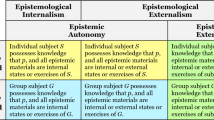Abstract
This essay argues that Alvin I. Goldman's truth-linked theory of group knowledge (veritism) omits individual components of social cognition, that all group based theories of knowledge lead to scepticism, and that if any sense is to be made of social knowledge, it must be done on individualist lines. I argue that Goldman's veritism can be reconstructed by adopting a reliabilist theory,social reliabilism. And I argue that Goldman's objections to a particular sort of consensualism are not telling. So there are now two plausible and competing theories of social knowledge-social reliabilism and consensualism.
Similar content being viewed by others
References
Audi, R.: 1988,Belief, Justification, and Knowledge, Wadsworth, Belmont.
Audi, R.: 1989, “Review of Goldman,Epistemology and Cognition’,Philosophy and phenomenological research 49, 735–736.
Baron, R. A. and D. Byrne: 1984,Social Psychology: Understanding Human Interaction, Allyn and Bacon, Boston.
Corlett, J. A.: 1991, “Epistemology, Psychology, and Goldman”,Social Epistemology 5, 91–100.
Deiner, E.: 1980, “Deindividuation: the absence of Self-Awareness and Self-Regulation in Group Members”, in P. B. Paulus (ed.),Psychology of Group Influence, Earlbaum, New Jersey.
Fuller, S.: 1988,Social Epistemology, Indiana, Bloomington.
Goldman, A. I.: 1986,Epistemology and Cognition, Harvard, Cambridge.
Goldman, A. I.: 1987, “Foundations of Social Epistemics”,Synthese 73, 109–144.
Janis, I. L.: 1982,Groupthink, second edition, Houghton Mifflin, Boston.
Lamm, H. and D. G. Meyers: 1978, “Group-Induced Polarization of Attitudes and Behaviour”, in L. Berkowitz (ed.),Advances in Experimental Social Psychology, vol. 11, Academic, New York.
Lehrer, K.: 1987, “Personal and Social Knowledge”,Synthese 73, 87–107.
Lehrer, K.: 1990,Theory of Knowledge, Westview, Boulder.
Lehrer, Keith and C. Wagner: 1986,Rational Consensus in Science and Society: a Philosophical and Mathematical Study, Reidel, Dordrecht.
Meyers, D. G. and H. Lamm: 1976, “The Group Polarization Phenomenon”,Psychological Bulletin 83, 602–627.
Pollock, J. L.: 1984, “Reliability and Justified Belief”,Canadian Journal of Philosophy 14, 103–114.
Pollock, J. L.: 1986,Contemporary Theories of Knowledge, Rowman & Littlefield, Totowa.
Swap, W. C.: 1982, “Destructive Effects of Groups on Individuals”, in H. Brandstatter, et. al. (eds.),Group Decision Making, Academic, New York.
Turner, J. C., Hogg M. A., Oakes P. J., Reicher S. D., and Wetherell M. S.: 1987,Rediscovering the Social Group: a Self-Categorization Theory, Basil Blackwell, London.
Author information
Authors and Affiliations
Additional information
I am grateful to Keith Lehrer and Alvin Goldman for their criticisms of previous drafts of this paper.
Rights and permissions
About this article
Cite this article
Corlett, J.A. Goldman and the foundations of social epistemology. Argumentation 8, 145–156 (1994). https://doi.org/10.1007/BF00733366
Issue Date:
DOI: https://doi.org/10.1007/BF00733366



